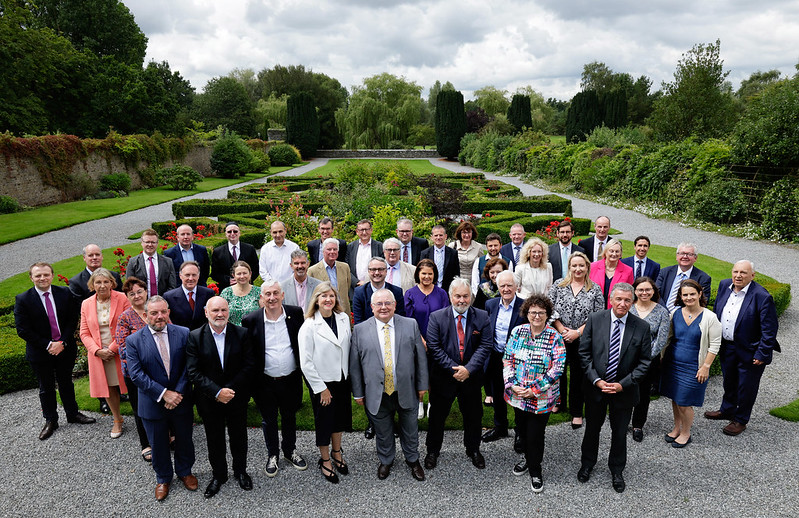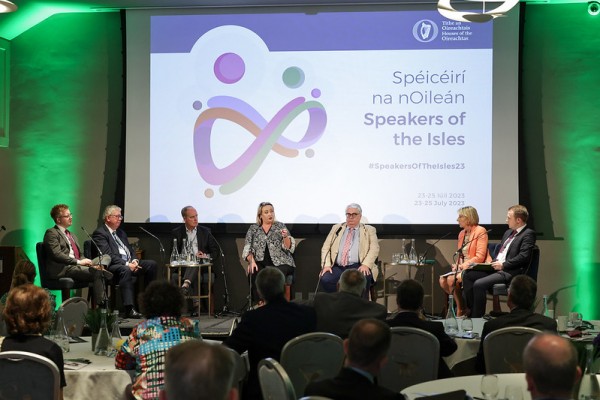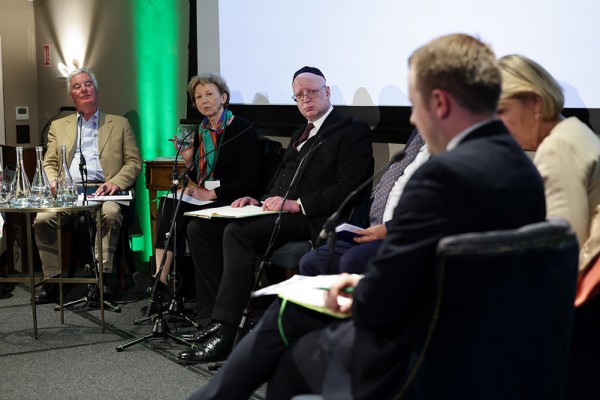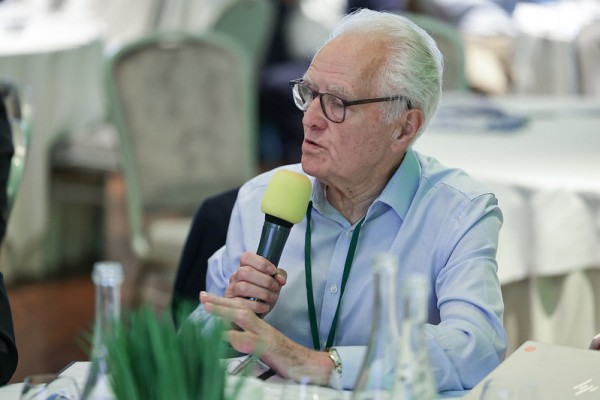
This inaugural meeting of the Speakers of the Isles conference brought together speakers and clerks of the parliaments and assemblies of neighbouring islands to discuss matters of shared interest and relevance.
The event, hosted at Kilkea Castle between Sunday 23 July and Tuesday 25 July, was an opportunity to share knowledge and experience with colleagues across parliamentary networks and enhance working relationships. The occasion demonstrated our shared commitment from across these islands to maintaining strong interparliamentary relations in a post-Brexit world.
Conference programme
The programme for the Speakers of the Isles was designed to encourage open dialogue and discussion on matters of importance in a collaborative setting. Sessions and discussions were facilitated by experienced external moderators and all delegates were encouraged to contribute and participate.
Sessions were in the format of panel and roundtable discussions facilitated by an experienced moderator. A number of guest speakers, all leaders in their area of expertise, were invited as panellists for each session. Contributions from audience members were also enabled and encouraged.
Theme 1: Parliamentary privilege: realistic or redundant?

Panellists discuss the first theme of the conference
Monday, 24 July – 9.45am
This session took place after a welcome address by the host of the Speakers of the Isles conference, Ceann Comhairle of Dáil Éireann, Deputy Séan Ó Fearghaíl.
Parliamentary privilege is a cornerstone of parliamentary democracy. It gives parliaments the right to make its own rules and regulate its own internal affairs and it ensures that members of parliaments can speak freely in parliamentary debates uninhibited by possible defamation cases.
Within the constitutional provisions, parliamentary rules on debate place boundaries on the freedom of speech of members. Controversies arise from time to time when Members use parliamentary privilege to name people outside of parliament. How do we best balance the rights of members of parliament and people outside parliament?
The session was moderated by Áine Lawlor and Gavan Reilly.
Panellists:
Conleth Bradley, practising barrister with a doctorate in governance
Former Chief Justice Frank Clarke, President of the Law Reform Commission
Mellissa English, Chief Parliamentary Legal Adviser to the Houses of the Oireachtas
Professor David Farrell, Chair of Politics at University College Dublin
Professor Paul Wragg, Professor of Media Law at the University of Leeds
Theme 2: Ethics and standards in public life: protecting parliamentary democracy in a modern world.

Panellists discuss the second theme of the conference
Monday, 24 July – 2.00pm
Political parties and competition for political power are essential for sustainable democracy and money is a necessary part of this process. How parties raise funds and the regulation of party finance affects the nature of democratic representation.
Scandals about political finance and corruption have an impact on public trust in political institutions. Scandals affect voting behaviour and it seems that voters are less forgiving of financial scandals than sex or political-type scandals. Does this influence political party approaches to discipline when scandals or purported scandals are reported?
The session was moderated by Áine Lawlor and Gavan Reilly.
Panellists:
Elaine Byrne, barrister and author of Political Corruption in Ireland 1922-2010: A Crooked Harp
Stephen Collins, political columnist with the Irish Times
Daniel Greenberg, House of Commons Parliamentary Commissioner for Standards.
Olivia O’Leary, broadcaster and presenter
Garrett Sheehan, chairperson of the Standards in Public Office Commission
Theme 3: Public discourse and security in political life: impact on parliamentarians.
Tuesday, 25 July – 9.00am
There is a certain cut and thrust expected between rival politicians, parties and their supporters and the challenge is to avoid the tipping point where robust debate becomes harassment or worse. Across the world political violence is a fact of life, particularly during elections and at the handover of power. Politicians face risks when carrying out their duties and there is a fine line between activities to protect politicians and others from online abuse and political censorship.
What can politicians do to affect the tone of political discourse? What can be done to address the security of politicians both online and in the real world? Are there specific triggers for the abuse of politicians?
The session was moderated by Áine Lawlor and Gavan Reilly.
Panellists:
Ambassador Claire Cronin, United States Ambassador to Ireland.
Frances Fitzgerald, MEP for Dublin City and County
Sir Lindsay Hoyle, Speaker of the House of Commons
Sam McBride, Northern Ireland editor of the Belfast Telegraph and the Sunday Independent
Anne Marie McMahon, Deputy Commissioner of An Garda Síochána for policing and security
Chris Yiu, director of public policy for northern Europe at Meta

John McFall, Baron McFall of Alcluith, Speaker of the House of Lords, makes a contribution.

